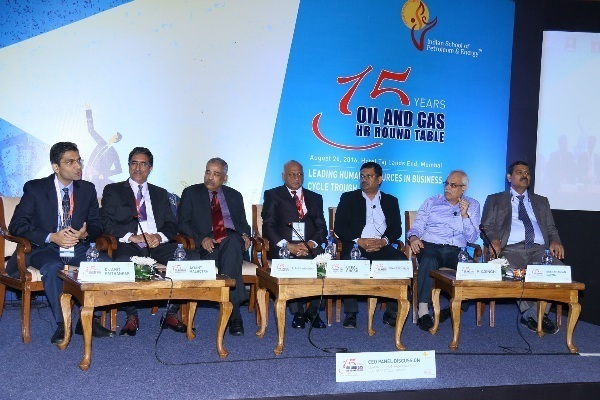Mumbai [India]: At a time when HR training is witnessing phenomenal changes the world over, it is imperative that Indian oil and gas companies reinvent their human resource strategies to meet the challenges facing the sector and prepare employees for the exciting future that awaits the energy space.
This was the consensus of a distinguished panel of energy leaders at the 15th Oil and Gas HR Round Table – Leading Human Resources in Business Cycle Trough organised in Mumbai, today, by the University of Petroleum & Energy Studies (UPES).
Speaker after speaker was of the opinion that the current downturn in the oil and gas industry was a great opportunity for training, retraining and reskilling the workforce. This would arrest the decline in the talent pool and make the sector more attractive for the younger generation looking to build careers in this critical industry.
UPES CEO and President Utpal Ghosh set the tone for the stimulating debate on guiding human resource through the downturn when he spoke of the urgent need to reinvent HR strategy so as to make it attractive for existing and future employees. He said oil and gas companies could create and implement relevant training and skill development programmes that would not only help retain the current workforce but also rope in fresh talent. This would enrich the oil and gas companies and result in consolidation of the industry.
Ghosh said, “Skill India, Make in India and Digital India are great ideas and they need to be converted to outcomes and actions. Considering I represent a petroleum academic institution, Skill India for the oil and gas sector is close to my heart. There must be close engagements between the industry and academia to ensure graduates are more employable. The focus here, in addition to hard technical skills, should also be on soft skills – communication – the ability to lead and take people along.”
Several industry experts voiced their concerns about human resource in the current scenario and suggested ways to improve HR strategies in the oil and gas sector.
Jayant Malhotra, Vice-President, Schlumberger Asia Services Ltd: “I see the business cycle trough in the oil and gas sector as a great opportunity to retrain and prepare the technical workforce for the future. We need to introspect on our HR strategies and find alternate ways of retaining people. We can do this by providing structured training and development programmes for employees at all levels. This will enable organisations to be ready for the upswing in the industry.”
Rajiv Kumar Singh, Head (HR) – Corporate Support Services, ONGC Videsh Ltd: “There is nothing to be worried about. There are no fears of manpower deserting the oil and gas industry. I don’t see a bloodbath in the sector. I believe we are living in interesting times and I am optimistic about the future. But we need to rejig our HR strategies and prepare to embrace the challenges and opportunities that await us.”
Subramanian Sarma, CEO & Managing Director, L&T Hydrocarbon Engineering Ltd: “I am optimistic as change is an integral part of the business lifecycle of the oil and gas sector. I see a bright future for employees, particularly at the middle level. Oblivious of the challenges, I see this as a great opportunity for organisations to readjust and readapt for the future.”
P. Raghavendran, President – Refinery Business, Reliance Industries Ltd: “Adapting to changes in the oil and gas sector is not easy because of long investment and project lifecycles. From an HR perspective, the industry needs to train the workforce in specialised skills that will enable employees to handle challenges better. It is also important to manage adverse situations within the industry by tapping and nurturing talent at the induction level itself.”
Dr. Amit A. Paithankar, Vice President & Managing Director, Emerson Process Management (India) Pvt. Ltd: “I believe oil and gas companies need to establish a core team of people to decide on human resource strategies that will set off an avalanche of goal-oriented ideas. The idea is to get this core together and initiate ‘action learning programmes’ at every level of the organisation. We need to have the entire organisation engaged in the fabric of learning and development.”
Shaji Zacharias, India Leader Energy Practices & Global Practice Head – Commodities Trading & Risk Management, Wipro Ltd: “The workforce should be geared to adapt to changes in this critical sector. Oil and gas companies would do well to have in place a good and appropriate HR employment policy. Organisations should provide unique learning solutions that can help employees, particularly the younger generation, overcome hurdles in the sector.
The Dehradun-based University of Petroleum & Energy Studies works closely with oil and gas companies and plays an important role in training employees at all levels of the industry through its industry arm- Indian School of Petroleum and Energy (ISPe). It inculcates right attitude and right behaviour among the workforce, and brings out the hidden talents that can have a positive impact on the growth and success of the companies. (ANI)

